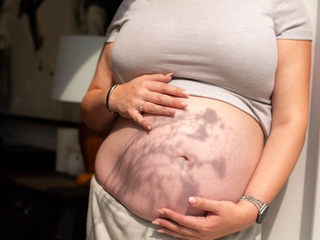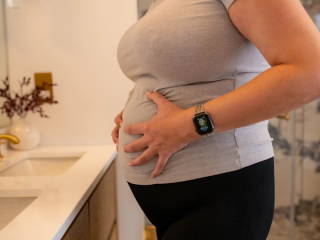
- Home
- Advice Hub
- Pregnancy
- Pregnancy Symptoms & Issues
- Pregnancy Symptom Checker
Pregnancy symptom checker
This article will discuss some of the most frequently experienced pregnancy symptoms and whether or not they may be a cause for concern.
Early pregnancy is a time of excitement, anticipation, and often, a myriad of physical and emotional changes. From subtle signs to more obvious symptoms, everyone’s experience is unique, and you may be wondering what symptoms are normal and what are not. This article will discuss some of the most frequently experienced pregnancy symptoms and whether or not they may be a cause for concern.
Early signs of pregnancy
After conception, the fertilised egg changes rapidly and develops into an embryo. There are huge hormonal shifts within the body which can result in a number of pregnancy signs.
Missed Period:
One of the most well-known indicators of pregnancy is a missed period. For those with regular menstrual cycles, a missed period can signal the possibility of pregnancy. This is the time when pregnancy tests are more likely to be positive if someone is pregnant.
Nausea and vomiting:
Often referred to as morning sickness, can occur as early as two to three weeks after conception. While the term "morning sickness" suggests symptoms primarily in the morning, these feelings of nausea can persist throughout the day. Though its exact cause remains unclear, hormonal changes are believed to play a significant role, specifically the HCG hormone which is secreted by the developing placenta. Eating little and often, avoiding large fatty meals, eating a dry snack upon waking may help alleviate morning sickness. If you're vomiting frequently and unable to keep down food or water, it might indicate hyperemesis, a severe pregnancy sickness requiring a doctor or midwife visit.
Breast Changes:
During early pregnancy, many women experience changes in their breasts. This may include tenderness, swelling, or tingling sensations. The breasts may also feel heavier or fuller as blood flow increases and milk ducts enlarge in preparation for breastfeeding.
Fatigue:
Feeling unusually tired or fatigued is a common symptom of early pregnancy. This fatigue is often attributed to hormonal changes and the body's increased metabolic demands as it works to support the developing foetus. Tiredness can be even more pronounced if it’s not your first baby and you already have a small child to look after.
Frequent Urination:
Increased urinary frequency is another hallmark symptom of early pregnancy. This occurs due to hormonal changes that cause the kidneys to filter more blood, resulting in more urine production. Additionally, the growing uterus can exert pressure on the bladder, further increasing the urge to pee.
Food Aversions & heightened sense of smell:
Changes to food preferences is very common during pregnancy. Some will develop strong cravings for certain foods while feeling averse to others. These aversions can vary widely and may be influenced by hormonal fluctuations and nutritional needs. Pregnancy hormones can also enhance the sense of smell, making certain odours more intense or even triggering nausea. This can apply to certain foods, triggering the aversion.
Mood Swings:
Fluctuations in hormone levels during early pregnancy can impact neurotransmitters in the brain, leading to mood swings and emotional changes. Feelings of happiness, excitement, anxiety, or irritability are all normal reactions to the profound changes taking place in the body.
Bloating and Constipation:
Hormonal changes can slow down the digestive system, leading to increased gas, bloating, and constipation. These symptoms may be exacerbated by the growing uterus putting pressure on the intestines.
Spotting or Light Bleeding:
Some people may experience light spotting or bleeding, known as implantation bleeding, around the time of implantation—typically one to two weeks after conception. This may appear as a few pink or brown spots when wiping. Any bright red fresh bleeding should be checked out by a maternity health professional.
Nosebleeds or bleeding gums:
Increased blood flow in the body may make you more susceptible to nosebleeds and bleeding gums. Dental check-ups are free during pregnancy so be sure to take advantage of that!
A-Z of pregnancy Symptoms
Navigating bleeding during pregnancy can be a real source of anxiety for many. While bleeding can sometimes occur during pregnancy, it's essential to understand what is considered normal and when it warrants immediate medical attention.
Mild ‘spotting’ during the first trimester is quite common This usually looks like a pink or brown discharge when wiping or on your pad. Implantation is thought to be a common cause, when the fertilised egg buries into the lining of the womb. It may also occur due to cervical irritation after intercourse. Heavy, bright red or persistent spotting or bleeding, especially if accompanied by abdominal pain, should be investigated.
For some People, breasts may become larger and feel tender, just as they might do before a period. They may also tingle. The veins may be more visible, and the nipples may darken and stand out. This can happen during any stage of pregnancy, though discomfort is quite common during the first trimester. As pregnancy advances, breasts prepare for nursing by producing colostrum, the baby’s first milk. Some women may observe leaking or yellow crusting on the nipples, particularly in the third trimester. A good fitting bra in the day will help to keep breasts supported.
Abdominal cramping similar to period type cramps is another common pregnancy symptom during the first trimester. If it is mild, short lasting, and is not accompanied with any bleeding, it is unlikely to be anything to be concerned about. If abdominal cramping is severe, persistent or accompanied with vaginal bleeding, fever or vomiting/diarrhoea, it should be checked out by a health professional. Cramping in the later stages of your pregnancy could be a sign of the beginning of labour. It may feel like period type cramps that are mild and irregular at first, getting stronger, longer and closer together as time passes.
Diarrhoea and vomiting during pregnancy can be unsettling symptoms that may occur at various stages and for a multitude of reasons. While morning sickness is a common experience in early pregnancy, characterised by nausea and occasional vomiting, more severe symptoms like persistent vomiting over 5 times per day is classed as hyperemesis gravidarum, a debilitating condition that can occur throughout pregnancy. In many cases, hospital treatment is required to prevent dehydration and manage symptoms.
Diarrhoea in pregnancy may be caused by issues such as gastroenteritis or food poisoning. These symptoms may also be accompanied by fever, abdominal pain, and dehydration. If experiencing diarrhoea and vomiting during pregnancy, it's crucial to stay hydrated by drinking plenty of fluids, preferably water or electrolyte-rich beverages, and eating small, bland meals when possible. If symptoms persist, worsen, or are accompanied by fever, abdominal pain, or decreased foetal movement, seek medical attention promptly. Diarrhoea may also occur prior to the start of labour due to the increase in the amount of prostaglandins released by the cervix.
Changes in vaginal discharge are common and often occur due to hormonal fluctuations and increased blood flow to the pelvic area. During pregnancy, you may notice changes in consistency, colour, and amount of discharge. In early pregnancy, increased vaginal discharge, often clear or milky white in colour, can be attributed to the thickening of the vaginal walls and the production of mucus to protect the cervix. Later in pregnancy,just before labour begins, discharge may increase in volume and may contain streaks of blood or mucus, known as "bloody show,".
If discharge is accompanied by itching, burning, a foul odour, or changes in colour resembling cottage cheese, it may indicate a vaginal infection such as yeast infection or bacterial vaginosis, requiring medical attention. Generally, maintaining good hygiene practices, wearing breathable cotton underwear, and avoiding douching can help manage normal vaginal discharge during pregnancy.
Fatigue during pregnancy is a common and often expected symptom that can occur at various stages due to a combination of physical, hormonal, and emotional factors. In early pregnancy, elevated progesterone levels can cause fatigue, inducing sleepiness and lethargy. Later in pregnancy, as the body undergoes significant changes to support foetal growth, fatigue may intensify due to factors such as increased blood volume, hormonal fluctuations, and the physical strain of carrying extra weight. Emotional stress, anxiety, and poor sleep quality can exacerbate feelings of fatigue during pregnancy. You can manage fatigue by prioritizing rest, maintaining a healthy diet, engaging in gentle exercise or prenatal yoga, and seeking support from loved ones to reduce stress.
There's nothing worse than a headache that you just can’t shift, particularly if you are pregnant. Unfortunately, headaches are another common concern that can occur at any stage of pregnancy, though they are more prevalent in the first and third trimesters. While headaches during pregnancy are often benign, they can sometimes indicate serious conditions like preeclampsia or high blood pressure. In the first trimester, headaches may be related to hormonal fluctuations and increased blood flow, while in the third trimester, they may be exacerbated by factors such as stress, fatigue, dehydration, and poor posture.
To help alleviate headaches during pregnancy, it's important to stay hydrated try to keep stress levels low and get enough sleep. Seek medical attention promptly if headaches are severe, persistent, or accompanied by vision changes, swelling, or upper abdominal pain to ensure safety for both mother and baby.
High temperature, or fever, during pregnancy can occur at any stage and may be a cause for concern. A slight increase in body temperature is normal during pregnancy, but a fever over 99.5°F (37.5°C) should be monitored and evaluated by a healthcare provider. Fever during pregnancy can be caused by various factors, including infections such as the flu, urinary tract infections, or other bacterial or viral illnesses. It's crucial to seek medical attention promptly if you experience a fever along with other concerning symptoms such as severe headache, abdominal pain, vaginal bleeding, or decreased foetal movement.
As the baby grows rapidly, the skin on the abdomen will start to stretch which may lead to itching. This may also occur on the breasts and thighs, particularly in the third trimester. It can be alleviated by moisturising the skin often and ensuring a good fluid intake. Severe and persistent itching on the palms and soles can indicate intrahepatic cholestasis of pregnancy (ICP), a condition affecting liver function and bile flow. ICP typically occurs in the third trimester and is characterised by intense itching, especially at night. Sometimes other symptoms appear such as dark urine, pale stools, and jaundice (yellowing of the skin and eyes). Any incidences of itching should be discussed with your doctor or midwife.
Foetal movements can usually be felt anywhere between 14-23 weeks of pregnancy but it’s not until later on at around 28 weeks when a distinct pattern can be felt. Changes in foetal movements during pregnancy are often noticed as variations in the frequency, intensity, or pattern of the baby's movements. While it's normal for foetal movements to fluctuate throughout the day, a noticeable decrease in movement or a significant change in pattern may indicate potential concerns and should be addressed promptly.
There are many things which can affect feeling foetal movements including the positionof the placenta, hydration and stress. If you notice a significant change in movements, call your maternity unit for advice immediately. Don’t wait until the next day to be assessed.
Painful urination during pregnancy can be a concerning symptom that may indicate an underlying issue such as infection. Bladder pressure is common in the third trimester, but persistent or severe pain may indicate a UTI or other urinary tract issues needing treatment. A simple urine test at the GP surgery or midwife clinic may be able to identify a UTI.
Symptoms of a UTI may include a burning sensation or pain while urinating, frequent urination, urgency, and cloudy or bloody urine. However, if left untreated, UTIs can lead to more serious complications such as kidney infections, preterm labour, or low birth weight. To reduce the risk of UTI’s, ensure you drink at least 2-3 L of water daily, always wipe from front to back after using the toilet, maintain a healthy diet and wear breathable underwear.
Swollen hands and feet, also known as oedema, are common discomforts experienced by many people during pregnancy, particularly in the later stages.This swelling is caused by increased blood volume, hormonal changes, and the pressure of the growing uterus on blood vessels and lymph drainage. Mild swelling in pregnancy is normal, especially at the end of the day or in hot weather. However, sudden, severe swelling, along with symptoms like headache, vision changes, or high blood pressure, may indicate a serious condition like preeclampsia, caused by placental issues affecting blood pressure.
Mild swelling can be alleviated by resting and elevating the limbs, not standing to long and drinking plenty of water. Any swelling that occurs suddenly, particularly if accompanied by other symptoms such as chest pain, headaches or visual disturbances, should be checked out by your care provider.
Changes is vision are not a normal pregnancy symptom and may indicate underlying issues that require medical attention. If you experience double vision, flashing lights, or sudden onset of blurry vision call your maternity unit without delay as this may be a sign of preeclampsia or or diabetes. Another less common cause of visual disturbances during pregnancy may include migraines, more common if you already suffer from them.
Varicose veins typically manifest as swollen, twisted veins that may appear bluish or purple in colour, most commonly in the legs. Some people develop these veins due to increased pressure on lower body veins from the growing uterus and hormonal changes relaxing blood vessel walls. While varicose veins are generally considered a normal part of pregnancy and may cause discomfort such as aching, throbbing, or itching, they rarely pose significant health risks. If varicose veins are going to appear, it’s more likely in the late second and third trimesters as the body is gaining more weight. Compression stockings, lifestyle modifications, or other interventions may be recommended to alleviate symptoms and reduce the risk of complications.












